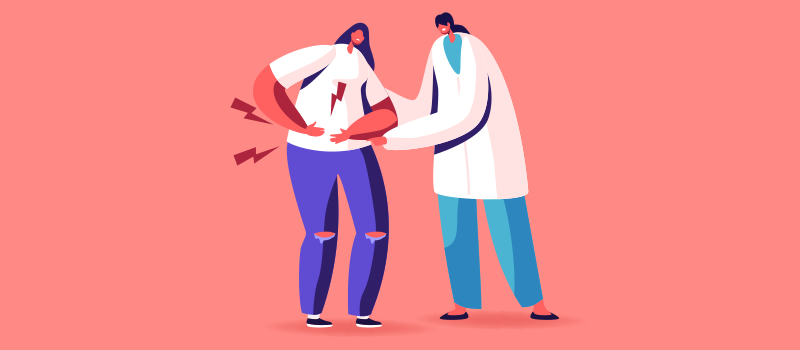What’s the Buzz
The Bee Healthy Blog
Does Acid Reflux Cause Gas?

Passing gas can be potentially embarrassing, but is not otherwise a cause for concern. On the other hand, acid reflux is not only uncomfortable but can also lead to serious health complications if left untreated. In this article, we’ll look at the relationship between acid reflux and gas, specifically whether acid reflux can cause gas.
What is gastroesophageal reflux disease (GERD) or acid reflux?
Gastroesophageal reflux disease (GERD), also called acid reflux disease, is a common digestive system condition. It occurs when the one-way valve called the lower esophageal sphincter (LES) does not work properly. The lower esophageal sphincter is located between the lower end of the esophagus (food pipe) and the stomach. When it relaxes or does not close properly, the acidic stomach contents backflow into the esophagus. This is called acid reflux and causes a burning sensation called heartburn. Heartburn is a common symptom of acid reflux or GERD.
While occasional mild heartburn is not something to worry about, you should see a healthcare provider if you have severe burning pain or frequent heartburn.
Untreated GERD symptoms can lead to health conditions such as scarring, ulcers, Barrett’s esophagus (precancerous changes), and esophageal cancer.
What makes acid reflux worse?
Certain foods like salty, fried, and fatty foods can trigger acid reflux by causing the stomach to produce excess acid, allowing the lower esophageal sphincter (LES) to relax more or causing the food to stay in the stomach for longer.
Other risk factors for GERD include smoking, drinking alcohol, obesity, pregnancy, and certain medications that can cause acid reflux as a side effect.
Another risk factor for GERD is a condition called hiatal hernia, in which there is an abnormally large opening in the diaphragm that allows the upper part of the stomach to slide into the chest. However, not everyone with a hiatal hernia has reflux symptoms.
What is gas?
Intestinal gas consists of air that is trapped in the digestive tract. It is generated when undigested food moves through the intestines and is broken down. Gas can also occur if you swallow excess air.
The passing of gas is a natural digestive process. It is normal to pass gas present in the small intestine and large intestine through the rectum (flatulence) and gas present in the upper digestive tract through the mouth (belching or burping) several times a day.
Certain foods that the body cannot digest easily are more likely to produce gas and stronger smelling gas, such as beans, asparagus, onions, and milk.
Also, poorly fitting dentures can cause you to swallow air excessively, leading to flatulence, belching, and burping.
Can acid reflux cause gas?
Acid reflux and gas are not directly related. However, they can occur together and make each other worse. Many of the same things that cause gas also trigger acid reflux. For example, overeating too quickly can lead to both acid reflux and excess gas. Large meals trigger the release of more acid from the stomach lining, making acid reflux worse. Large amounts of food also cause you to swallow more air, resulting in more gas.
Similarly, drinking carbonated beverages or fizzy alcoholic drinks like beer can worsen gastroesophageal reflux and gas.
Interestingly, the same lifestyle changes can reduce symptoms of both conditions. For instance, eating smaller meals and more frequent meals can help reduce gas and acid reflux symptoms by reducing stomach acid production and gas formation.
Lastly, chronic belching (relieving gas through the mouth) can worsen heartburn by causing more stomach acid to rise up into the throat.
Treatments for gastroesophageal reflux disease and gas
There are both prescription and over-the-counter medications available to treat heartburn, including antacids (Alka Seltzer, Tums), H2 blockers (Pepcid), and proton pump inhibitors (Prevacid, Prilosec).
Since gas is more or less harmless, there are fewer medications to treat it. Some medications that may help excess gas include Mylanta, Gas-X, Beano, and Lactaid.
Home remedies for heartburn and gas
Here are some home remedies that may help to relieve heartburn or excess gas:
- Add ginger to your food or drinks
- Eat licorice
- Try using activated charcoal to reduce gas. While safe to consume, activated charcoal can stain your teeth and clothes. It can also make certain medications less effective.
How to prevent acid reflux and gas?
Certain lifestyle changes can help prevent acid reflux and gas. You should try to:
- Make healthy food choices.
- Avoid foods that trigger acid reflux.
- Specifically, avoid heavy, greasy foods and spicy foods.
- Eat slowly to swallow less air.
- Eat smaller meals at regular intervals throughout the day.
- Stay upright after meals, especially after eating large amounts of food.
- Wear loose-fitting clothing.
- Raise the head of your bed for a few inches to keep the upper body raised while lying down.
- Stop smoking.
- Drink alcohol in moderation.
- Lose weight if you’re overweight or obese.
Wrapping up: The link between heartburn and gas
Gas and heartburn can occur separately or together. There is no direct link between these two conditions, but making simple lifestyle changes can help prevent both excess gas and acid reflux.
Again, while gas is not usually something to worry about and occasional heartburn can be treated with over-the-counter medicines, frequent or severe heartburn should be evaluated by a doctor.
References:











SOCIAL